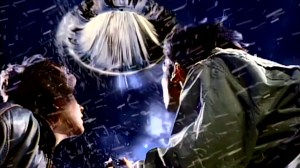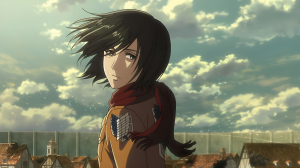Hollywood is no stranger to delivering audiences historical epics, but through industry limitations, most pictures had to rely on conveying events that could be recreated practically as the visual effects didn’t exist that could authentically transport audiences to another time. As visual effects evolved throughout the ’90s, Gladiator was able to embrace burgeoning technologies and blend them with real-world locations to fully immerse viewers in the world of ancient Rome to witness Maximus’ tragic rise, fall, and ultimate victory within the Roman empire as he sought vengeance against those who had wronged him. 20 years later, Gladiator is landing on 4K Ultra HD Blu-ray SteelBook to remind fans of its accomplishments, which is available now.
Videos by ComicBook.com
A key component in developing the project was producer Doug Wick, who has just as much passion for the film now as he had when he was developing it with director Ridley Scott. In the wake of Gladiator‘s release, a number of films attempted to repeat its successful formula, but with the film going on to earn five Academy Awards, including Best Picture and Best Actor, most efforts have failed to recapture what made the film such a triumph.
ComicBook.com recently caught up with Wick to discuss his work on the film, its impact, and what the future might hold for the series.
Incomplete Script Myths

ComicBook.com: One of the rumors that has circulated about Gladiator over the years is that the production was so massive that it went into production before a script was actually completed. Is there any truth to that idea?
Doug Wick: No, totally inaccurate. It’s funny, when something works, there’s so many different stories. No. Of course, we had a completed script. The writing was a long evolution. David Franzoni was the first writer. He was the one who had the idea to do a movie set in the arena. Then we hired John Logan, a really talented writer. He made huge strides and, really, he came up with Maximus’ family dying. He created the complexity of Commodus’ sibling, he did a lot of that work. And there were always challenges.
It’s a fight movie, so to have every fight move a larger narrative forward was hard. So then when Russell came aboard, Russell had concerns and questions about the script. And we were moving, we were in pre-production, and we brought in William Nicholson, who really made the ending work. But from fairly early on, Ridley knew the movie he wanted to make. And we all had a sense of what the target was, it was really just about making everything better. But the idea that we somehow began with, what did I read somewhere? Like a 35-page script is ridiculous, but there were by that time 50 rewrites.
CG Rhinos
Well I’m glad we can set the record straight on that. Only a few years before Gladiator, Braveheart debuted and became one of the dominating historical epics of the ’90s, which largely utilized practical effects and locations. Given your long history in the movie industry, were you at all apprehensive that the CG effects wouldn’t be able to convey the scale that you wanted it to? Or that it wouldn’t blend well with the practical footage?
No. Partly, one of the first movies, an early movie I did, was Stuart Little, where we had the first CG protagonist. So, I’m very aware that you can do anything with CG. It’s all about someone having the idea for what you want to implement. So again, if you had a lesser director then Ridley, it could be really problematic. But he has, first of all, he’s a painter himself. And he has such great taste that we knew we were in great hands. There were issues that were really more about cost, which is, for example, Ridley wanted a rhino in the arena. And when we talked to the animal trainers, they said, “Well, they’re great to work with, but once you start it, you can’t stop it.” So then we priced a CG rhino, and it was just too expensive. So I would say that that was one of the regrets, we couldn’t give Ridley a CG rhino.
That was another question I had, that despite the film’s accomplishments, I wondered if you had any regrets about things you wish you could revisit, and it sounds like a CG rhino is the answer.
Yes. It’s a running joke that if we ever do a sequel, Ridley gets his rhino.
Well, I mean, gladiators battling rhinos? If that doesn’t get butts in seats, I don’t know what will.
Exactly.
Oliver Reed’s Impact

With the ambition of the project, was there a specific moment either while shooting or while reviewing footage that you really realized that the gamble had paid off and you were able to make magic happen?
We knew we had something that had real dynamics, but, remember, fairly far into shooting, Oliver Reed died. So all of a sudden we had an extraordinary actor who had done an amazing performance through the movie, and suddenly we had lost him. We hadn’t completed the story, and most importantly, we hadn’t redeemed his character. He was the guy who sent these people in to die, and his redemption was a big part of the story. And in the script, he would be the guy who was walking the empty arena at the end, like an old theater director. So in a lot of these questions, it was only because of Ridley’s extraordinary craftsmanship that I flew in with Bill Nicholson, the writer from London, to figure out how we could end the movie.
One of the first things that was on the table was, we could go back to every location. The insurance would have to pay $60 million to re-shoot everything, and Ridley looked like he needed a drink. And then we figured out a solution that would involve taking earlier scenes of Oliver Reed, repurposing them in a new conversation with Maximus, so we could show Oliver Reed letting him out and then dying. Again, you can only do that, probably five directors in the world can do that as well as Ridley did it.
Alternate Avenues
Whether it be Ridley Scott or Oliver Reed or Russell Crowe, all of these components blended for this unique experience and made it all possible. Were there points early on where you had nearly hired different filmmakers or stars that likely would have altered the film’s trajectory?
Actor-wise, we talked about movie stars and we felt like, for example, you couldn’t do it with Mel Gibson. Because after Braveheart, seeing him in a leather skirt again, you wouldn’t surrender to the fantasy. So we wanted someone who could pull it off, but also had the gravitas and the screen presence. And Russell wasn’t yet a star, but from his earlier work, you knew he was an extraordinary actor. I remember having a meal, we did a screening early in Rome. And I remember we were sitting outside having dinner and all these fans would come up, ignore Russell, and say, “Are you Ridley Scott?” to Ridley. And Ridley said to Russell, he goes, “Hey, pal. In about a week, you’ll never be having dinner outside like this again.”
We talked about other directors, but Ridley was always the best choice. I mean, you always have a list of other people. By the way, when I first was pitching the movie to studios, the first studio we went to said, “Sword and sandal is dead. You’re wasting your time.” It wasn’t easy to get going.
And then, of course, after Gladiator there was Troy and 300, all these movies attempted to cash in on what Gladiator ignited.
Also, if you’ve done it for a long time, you see that every great genre comes back. Again, it’s someone finding a fresh way to do it. Like clockwork, there’ll be a hit vampire movie every 20 years. And the same with sword and sandal, it’s just got kitsch.
Potential Future

Despite the fact that Maximus has died, there have been rumblings of a sequel moving forward with Ridley returning to direct. Are there any updates on the project gaining any sort of steam?
No. Ridley would love to do it. It’s really all about getting something on paper. [Everyone involved with the movie] loves the movie too much to ever consider cheaply exploiting it and making something that’s a shadow of it. So, it’s just really a clear creative problem. We’re working on a script, and if we can ever get it to a place … and Ridley is working on it. It’s really just a question, if we can ever get it to a place where it feels worthy to make it. It’s a real challenge.
And if anyone can do it, it’s Ridley. Just looking at Blade Runner 2049 or Prometheus, he’s proven he can come back to a franchise. No matter how many decades, and still turn out something really incredible.
But it’s also a real writing problem, too. Like any good movie, Gladiator works by the skin of its teeth, where this fight movie ends up adding up that way. Again, it’s always to take the best of what the audience is attached to, but make it fresh in some new incarnation. It is really challenging. And of course, the leading man is dead. Sometimes you just redo, if you do Godfather, you at least say, “Okay, the audience loves these stars in this wardrobe.” And bring back the old team.
Other Franchises
While I have you, I’m looking forward to the new The Craft that you produced. You also produced the original The Craft, and I was curious what that was like to revisit a project nearly 25 years after producing the original and finding a way to reinvent it.
It’s always challenging because I made The Craft so many years ago. And The Craft, I started doing because I just wanted to make a movie about teenage girls coming into their sexuality. And as I was reading about it, I was reading that the age-old mythology for talking about female empowerment and fear of it was witchcraft. So then I started going to writers to try and do that. It’s always a challenge. We talked to so many people and we found a really talented female writer/director [Zoe Lister-Jones]. And we’re very happy with what she’s doing, so we’ll see.
Also, you produced the three Divergent films, have there been any updates on the planned fourth movie?
It’s definitely on hold. There’s no imminent news.
I’m still holding out hope for that Gladiator sequel. I know that it was entirely abandoned, but Nick Cave’s script for that sequel always sounded really fascinating.
Really quickly, Russell’s agent called me after the opening weekend, said, “I got a great idea. They take the body around the corner of the arena. Russell gets off the stretcher and says, ‘Hey, it worked.’ And they high five. ‘They believed I’m dead.’” Meaning, that would be the beginning of the next movie. He was pitching that it was a fake death, so Russell could come back and do it.
I love the idea that, after this epic drama, Maximus merely high-fives his friend and they get into wacky hijinks.
Exactly.
*****
Gladiator is available now on 4K Ultra HD Blu-ray Steelbook.








